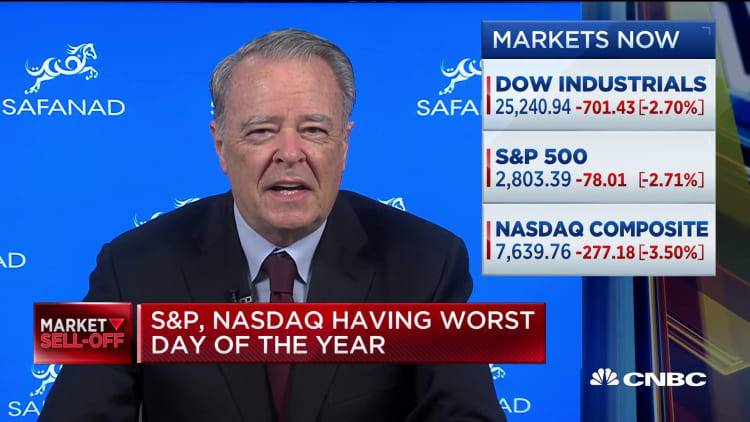China’s ‘self-destructive nuclear option’ in trade war: Selling US Treasury bonds
KEY POINTS
- Questions persist that China might stop buying U.S. debt as the two sides engage in a trade war.
- The issue arose Monday following a tweet from the editor of a Chinese state-run newspaper.
- Most experts think a China exit from the Treasurys market would be a last resort and hurt it more than it might the U.S.
Consider it China’s nuclear option in the trade war with the U.S. — the ability to start dumping its massive pile of Treasury bonds that could trigger a surge in interest rates and substantially damage the American economy.
As the two sides engage in a tit-for-tat tariff exchange, the possibility that China might raise the stakes and stop being the world’s biggest consumer of U.S. debt again reared its imposing head Monday.
China currently owns $1.13 trillion in Treasurys, a fraction of the total $22 trillion in U.S. debt outstanding but 17.7% of the various securities held by foreign governments, according to data from the Treasury and the Securities Industry and Financial Markets Association. Should the Chinese decide to walk away or reduce their role in the market, that, at least in theory, could create a substantial dislocation for a country such as the U.S. that relies so much on sovereign entities to buy its paper.
WATCH NOW
At least for the moment, markets aren’t that worried that China could take such a seemingly drastic step, in large part because the move might not have much upside except to create headlines.
“It’s a self-destructive nuclear option,” said Robert Tipp, chief investment strategist and head of global bonds for PGIM Fixed Income. “Maybe it helps them as a bargaining chip, but it’s endangering the value of something they’re deeply involved in.”
In fact, the move actually could help the U.S.
For one, a Chinese reduction of Treasurys could weaken the dollar and make U.S. multinationals more competitive. For another, Treasury yields would rise and thus cause prices to fall, lowering the value of China’s portfolio.
And there’s the question of where China would put its money — all that cash would have to go somewhere, and U.S. bonds are among the highest-yielding in the world when weighed against their relatively low risk.
“It still seems like Treasurys are the optimal place for security, flight to quality, capital appreciation etc. Moving around that sum of money seems very challenging now,” said Nick Maroutsos, co-head of global bonds for Janus Henderson. “It’s possible and could happen very gradually over a six- to 12-month period. But calling it and having it happen so quickly is very unlikely.”
‘The biggest weapon they have’
In fact, China already has been pulling back its role in the U.S. bond market. Its holdings have fallen nearly 4% over the past 12 months even as total foreign government ownership of Treasurys has increased by 2.6%.
Following its myriad disputes with the Trump administration, Russia has largely exited the Treasury market. Japan, the No. 2 holder of U.S. debt, has increased its holdings slightly over the past 12 months to $1.07 trillion, while Brazil has stepped into the No. 3 position with about $308 billion, thanks to a 12.9% boost during the period.
With the U.S. expected to be staring down $1 trillion annual budget deficits in the years to come, a less active Chinese government does generate some fears.
“To me, that is the biggest worry. This is really the biggest weapon they have,” said Sung Won Sohn, professor of economics at Loyola Marymount University and president of SS Economics. “They need to do more to counter the United States. So if push comes to shove, that’s what they are going to resort to.”
WATCH NOW
Because the U.S. imports far more from China than the other way around, China needs additional leverage to fight the tariff battle. While Sohn said shrinking its bond holdings would be a last resort, he sees it as possible if the U.S. decides to enact tariffs on all Chinese imports, which totaled $539.5 billion in 2018.
“I have become less and less optimistic and more pessimistic, because this is a trade war but it’s not as much about economics as it is other things,” he said. “In the United States, we view China as an economic predator. China views the United States as a model of Western power trying to humiliate China as in the 18th century. There’s a long, kind of simmering underneath of nationalistic feelings.”
Yields fall amid panic
Treasury yields actually moved lower during Monday’s stock market panic selling despite more chatter of a China bond market retaliation. A tweet from Hu Xijin, editor in chief of the state-run Global Times, noted that “Chinese scholars are discussing the possibility of dumping US Treasuries and how to do it specifically.”
“China will continue to use this as a threat, perhaps, but in reality I think it hurts them more than it might hurt us,” said Kim Rupert, managing director of global fixed income analysis at Action Economics. “It hurts their portfolio. Whether they are willing to endure the pain — I think they might, but not to a great extent. I think it will be more a threat than an actual tool or strategy.”
Stocks endured their worst day of the year Monday as fears continued to boil that a resolution was not on the horizon. A failed China trade deal has been among the market’s worst worries since President Donald Trump took office. A lack of a deal could threaten a U.S. economy that has been performing better than expected even as the rest of the world slows.
“If we look at how the market has performed year to date, obviously it’s been up very strong, pricing in recovering growth,” said Jason Draho, head of Americas asset allocation at UBS Global Wealth Management. “If escalating trade tensions slow global growth ... we may not get this recovery that the markets have been assuming.”



No comments:
Post a Comment
Comments always welcome!